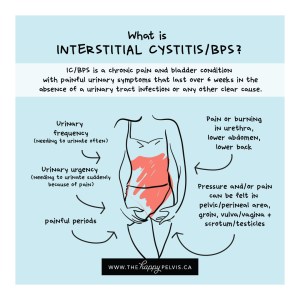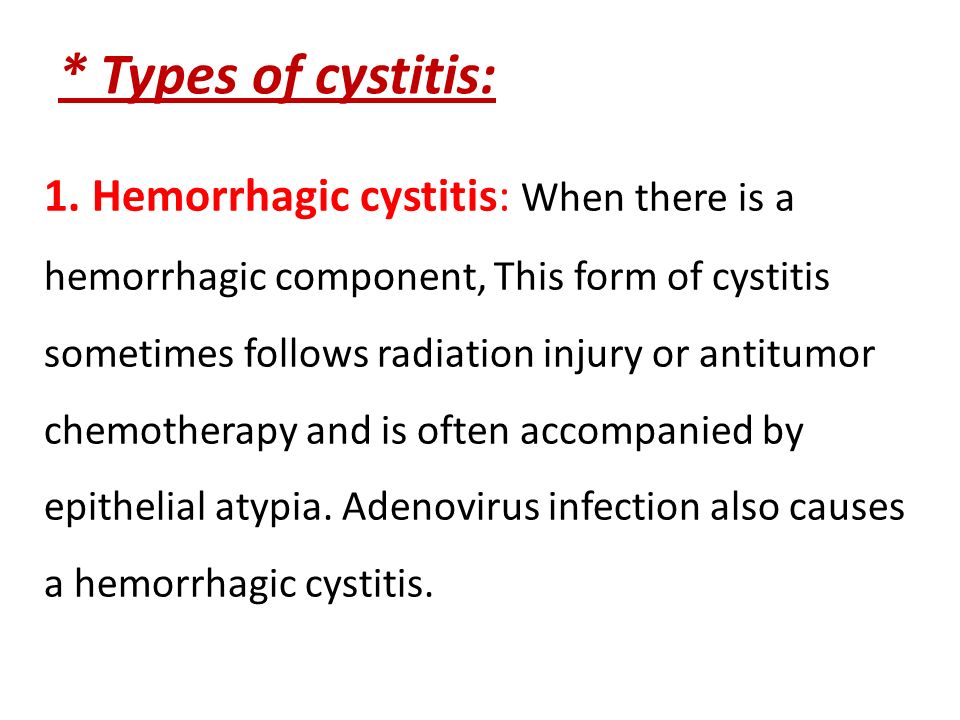
There are two main types of cystitis: inflammatory and non-inflammatory. Inflammatory cystitis can be caused by various conditions that can affect the urethra and bladder. These include pelvic spondylitis, gynecologic cancer, endometriosis, Chron’s disease, and lupus. Other causes of inflammatory and non-inflammatory inflammatory type of urinary tract inflammation are bladder stones, certain drugs, and pelvic inflammatory disorders.
There are different treatment options for different types of cystitis. Acute cystitis usually clears up quickly when treated with antibiotics, while chronic cystitis may require longer-term treatment. Regardless of the type of cystitis, appropriate care is necessary to prevent an exacerbation of the condition. This information is very helpful for the diagnosis and management of the condition. Let’s look at the most common types of cystitis.
Inflammatory cystitis occurs when bacteria infect the bladder. It is the most common type, and it is the most painful. It can also be caused by fungi, mycoplasma, trichomonas, chlamydia, or other organisms that affect the bladder. Other causes of inflammatory cystitis are the introduction of infection during therapeutic measures, and decreased muscle tone or the inflammatory effects of other illnesses.
Symptomatic cystitis is more common in women than in men and can be accompanied by other symptoms such as pain during urination, increased need for urination, and fever. In severe cases, the pain can be so severe that it can lead to permanent disability. Acute and non-inflammatory cystitis are the most common. Acute and uncomplicated cases of cystitis are treated with antibiotics. If the infections persist, however, they should be evaluated by a physician.
There are many different types of cystitis, but the most common one is acute. Acute cystitis can be a long-term condition and progress to chronic cystitis. It is common for patients to suffer with a chronic infection that may worsen over a period of years. In many cases, symptoms of chronic cystitis may be temporary. This can make it difficult to find a cure, so it is best to take the time to consult a doctor and try out different treatments.

When cystitis is severe, the patient will have an elevated temperature that may last for weeks or months. Other symptoms will include pain and discomfort around the chest, vomiting, and chills. Palpation of the abdomen will help identify the presence of symptoms of this infection. While there are many different cystitis types, they all have a common cause: bacterial cystitis. It is a common condition that can be easily treated and will go away on its own.
In the case of bacterial cystitis, antibiotics can be used to treat it. Symptoms of this condition are nonspecific and may be related to a bacteriological infection of the lower genitourinary tract. The symptoms of cystitis are similar to those of urinary tract infection. Some cases are easily managed by home remedies such as limiting caffeine intake, using a heating pad, and avoiding alcohol.
Cystitis is a common condition that causes inflammation of the bladder. Most cases of bacterial cystitis are caused by a bacterial infection. The infection can be painful and can lead to other problems. The most common treatment for bacterial cystitis is antibiotics. Other forms of cystitis are caused by a urinary tract infection. Sometimes the bladder can become infected with an infected catheter, which is the most common cause of infections.
Although there are many different types of cystitis, they are all similar in their symptoms and the type of antibiotics used. In women, the most common type is acute uncomplicated. For men, this is always a difficult condition. Acute uncomplicated cystitis is rare and is treated with antibiotics. In men, it is treated as a bacterial infection. Most people with this type of cystitis do not experience any symptoms.
Symptoms of both types of cystitis largely depend on the phase of the disease. When the disease is in remission, the symptoms are much less pronounced. In contrast, the symptoms of chronic cystitis are often absent or less pronounced than the symptoms of acute cystitis. While there are many different causes of inflammatory cystitis, each type is characterized by pain and inflammation. If you have a chronic form of the disease, you should immediately seek medical help and look for a proven and effective drug for cystitis https://igs.org.mx/urolesin.